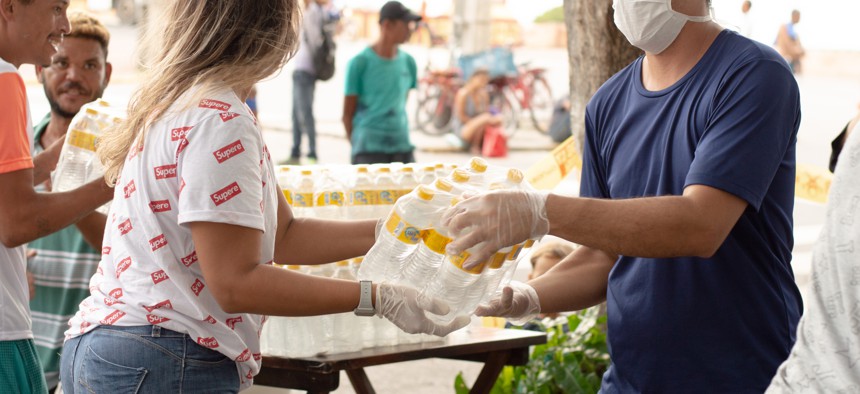COVID-19’s impact on human services already on path to “systematic failure”
A campaign is underway advocating to raise wages for workers at nonprofits already owed “hundreds of millions of dollars” on unpaid government contracts.

Human services Juliana F Rodrigues/Shutterstock
A new Human Services Council campaign is setting out to advocate for higher wages for human services workers after the devastating impacts of COVID-19.
According to the council, these workers generally make about 71% of what government employees make, and 82% of what private sector workers receive for the same role.
The new campaign, #Justpay, humanizes the struggles that human services providers have been facing with a video presentation that uses artistic expression to highlight their call on the incoming Adams administration for change. Before COVID-19, the human services sector was already facing hardship, with 68% of New York State’s nonprofits anticipating being unable to meet service demands of their communities due to underfunding.
The council represents about 170 human service providers across New York City, from child care to senior and homeless services and mental health. It was created to address the issues human services workers face, especially when it comes to the relationship providers have with government.
“There's about 800,000 workers who are under contract with the state, so human services workers who work at nonprofits get paid by government contract, and there's about 125,000 workers in the city. So, the government is the predominant payer of human services wages and also, therefore, the setter of those wages. Because of their competitive contracts, they really set what the rates are. So it is really a government funding issue when it comes to human services wages.” Michelle Jackson, the council’s executive director, told NYN Media.
“I think the sector has been on the brink of a systematic failure for a while. At the end of the De Blasio administration, we have providers who are owed hundreds of millions of dollars,” said Jackson. “The sector is really financially starved and has a work shortage and has workers who are burnt out. And so if we are unable to recruit and retain and appreciate that, I think we're going to see providers who are not able to deliver services because they don't have enough workers.”
“And we're going to have to see a real reimagining of the sector,” she added. “But if you can't retain qualified people to help reimagine with you, I think we're going to see people not being able to get the services that they need. Because we're not going to have the workers to do that work.”
Because of burn out, many human services nonprofits have suffered a vacancy rate of an estimated 11% as of March 2021 in a report about the impacts of COVID-19 on the sector which also called attention to the racial and gender disparities human services face. Human services workers are 66% female, over two-thirds are full-time workers of color (68%), and nearly half (46%) are women of color.
“There wasn't any kind of set of new problems, but there was a real conversation around the impact of low wages on the human services workforce. Some of the lowest paid workers in the state are overwhelmingly women and overwhelmingly people of color and they were absolutely essential during the pandemic,” said Jackson. “They were out there with health care workers and there was a real inequity in their access to PPE. They were not given bonus pay like the frontline workers in the pandemic.”
“In the human services world, providers are more likely to be people of color, like 85%,” Jackson continued. “So the sector really had this conversation around ‘Look how important these workers are, look at who they are, and how do we really make a drive for more equitable pay?’ and so that's why we convened the #justpay campaign, to really focus our advocacy efforts on creating a more equitable payment structure for human services workers.”
The #Justpay campaign hopes the Adams administration will prioritize the needs of human services workers so they can provide the essential services New Yorkers need.
“Unfortunately the administration is going to have a lot of cleanup,” Jackson said. “There's a lot of delayed payments and contracts that aren't registered that they're probably going to inherit. So we hope that they'll be able to put the resources into, unfortunately, doing some cleanup to get the sector back where it needs to be.”
The council will then want to move forward with a reimagining of the partnership between nonprofits and governments so that they “actually address community needs in a real equitable way and so human service organizations are paid fully for their work to be able to do their best that they are able to for their communities,” Jackson explained.
“So I think that's a long slow process but it will require partnership.”
